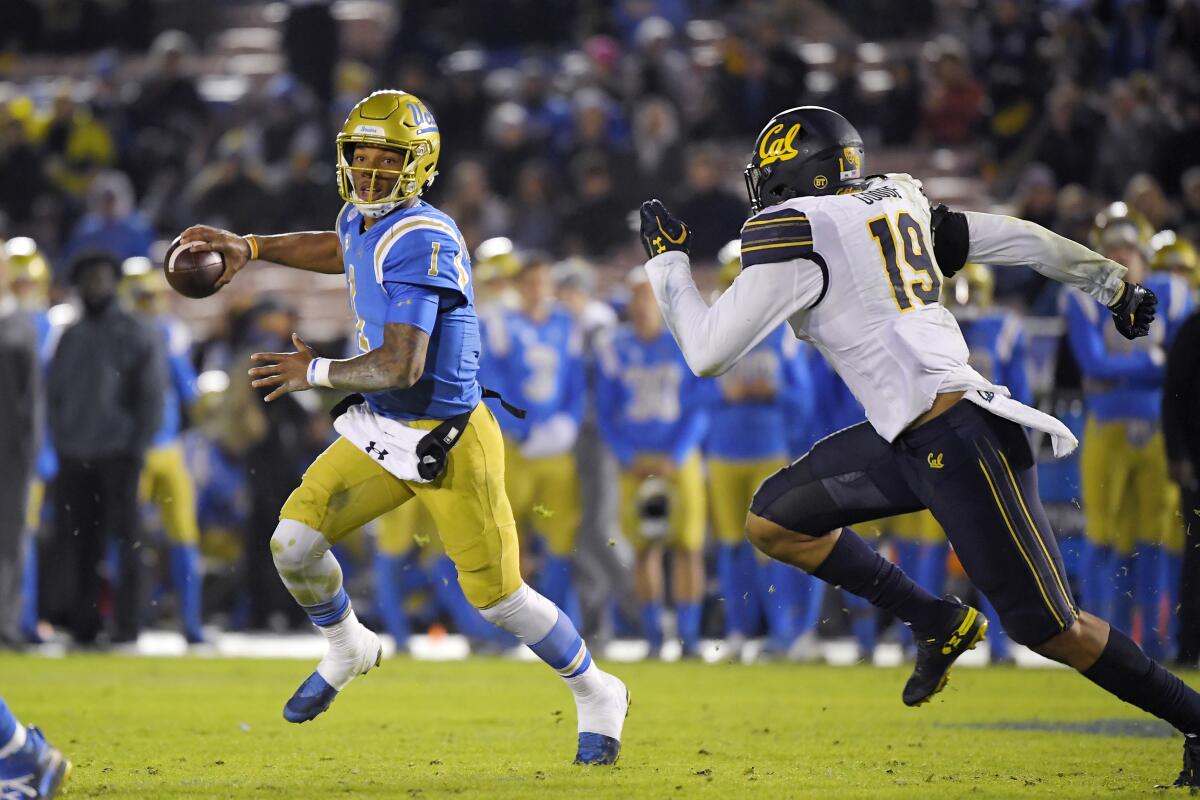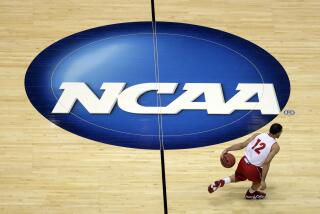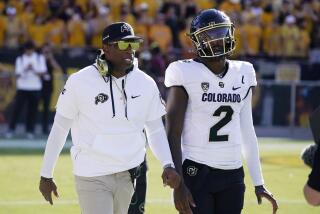Op-Ed: COVID-19 is making the NCAA’s exploitation of student-athletes even more obvious

As college sports programs reopen, student-athletes around the country are weighing the risks of COVID-19 as their universities encourage them to return to the field.
On Thursday, 30 UCLA football players issued a powerful letter condemning the university for failing to protect their health and safety. They demanded an independent health official to ensure that COVID-19 protocols are followed, whistle-blower protection to report violations, and the right for players to decide whether to attend sports events without fear of retaliation or loss of scholarships.
That the students should have to make such basic demands is shameful. But UCLA’s actions are not unique. Many colleges are pushing athletes back into active sports, potentially increasing their risks and the risks for everyone around them.
The COVID-19 pandemic has made the exploitation of student-athletes even more stark. It also shows why students playing under the auspices of the NCAA, which generates nearly $1 billion annually, should be paid.
The debate about pay for college athletes is certainly not new. The traditional arguments against paying athletes are that they receive other compensation such as scholarships and access to coaching; that these young adults wouldn’t be responsible with the money; and that paying student-athletes would erode traditions. None of those arguments give priority to students’ interests over institutional interests.
Now, with coronavirus cases rising in many states, decisions to bring back athletes without vaccines or strong safety protocols glaringly expose the colleges’ conflicts.
Most college athletes who have tested positive for coronavirus have proved to be asymptomatic, which means many may unknowingly spread the virus to others in the close quarters of locker rooms and on the field. College campuses, where young adults will always congregate in social spaces, are quintessential petri dishes for infections. That’s why the CDC recommends that college students be vaccinated for meningitis, for example. Why should COVID-19 be different?
The NCAA’s Division I Council lifted its moratorium on athletics in early June, allowing for sports to resume in person and last week approved six week in-person practice plans to start in July. Many colleges are contemplating holding fall 2020 classes remotely. If academics are safer remotely, how can sports — especially contact sports — be OK?
A linebacker for Oklahoma State, Amen Ogbongbemiga, tweeted in early June that he had tested positive for COVID-19. In the past two weeks, many student-athlete cases have been reported around the country, including 28 athletes and staff at Clemson University. Without fully functional testing and tracing programs in place, forcing students to accept the risk of COVID-19 is negligent and wrong. Millions of dollars may be at stake, but so are the health and safety of athletes and their fellow students. Many athletes need sports to pursue their dreams and possible professional careers, but we are still in a pandemic, and safety must come first.
Given that athletes are disproportionately Black in the biggest revenue-generating sports — football and basketball — this dynamic also evokes America’s horrific history of unpaid slave labor. It’s hard to ignore the racist undertones when the financial benefit to these institutions is based on the unpaid work of young Black men.
Historically, athletic programs generate revenue that may be used support other university programs, benefiting the entire student body. But even if there is benefit that is spread to all, it is not ethical to have only a few shoulder most of the risks. If college athletes aren’t mature enough to handle being paid money for their efforts, as the argument goes, how can they be expected to appropriately weigh the risks of returning to the field?
College students on athletic scholarships put their bodies and time on the line in exchange for tuition, room and board. The debate over pay for college athletes has always been about fair compensation for risk and efforts. COVID-19 has only added to those risks, as the group of UCLA football players recognized.
At a minimum, universities should assure student-athletes that they will not be penalized by loss of their scholarships if they believe it is unsafe to return to play. The demands of the UCLA football players are more than reasonable and should be used as a model for minimum protections guaranteed to student-athletes. Beyond that, COVID-19 shows that it’s time to start compensating athletes fairly.
Azmatullah Hussaini is a physician and president of the American Muslim Health Professionals, New York/New Jersey chapter. Jules Lipoff is an assistant professor of dermatology at the University of Pennsylvania Perelman School of Medicine.
More to Read
A cure for the common opinion
Get thought-provoking perspectives with our weekly newsletter.
You may occasionally receive promotional content from the Los Angeles Times.










